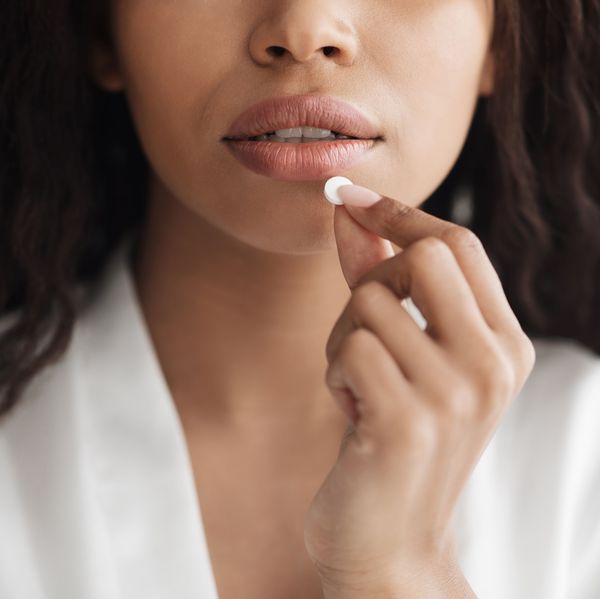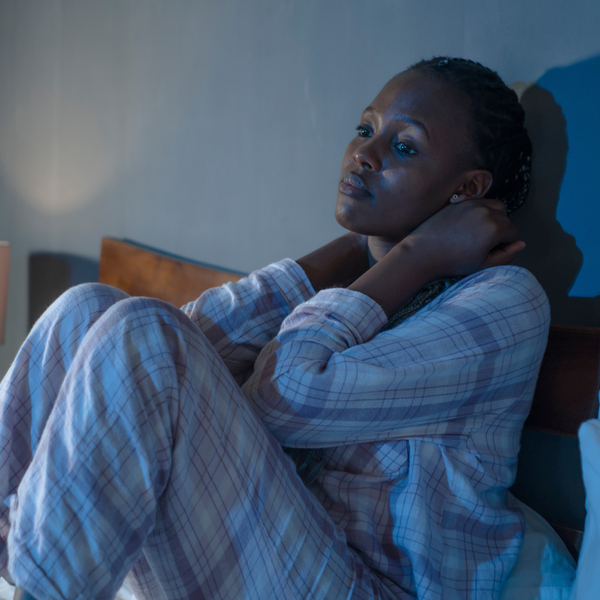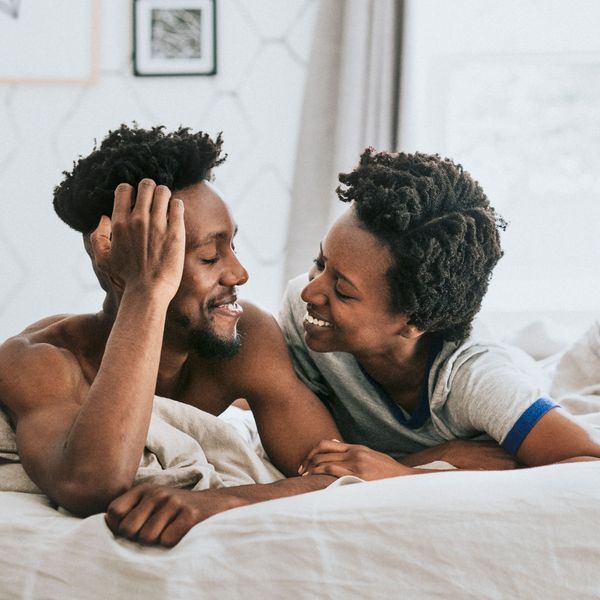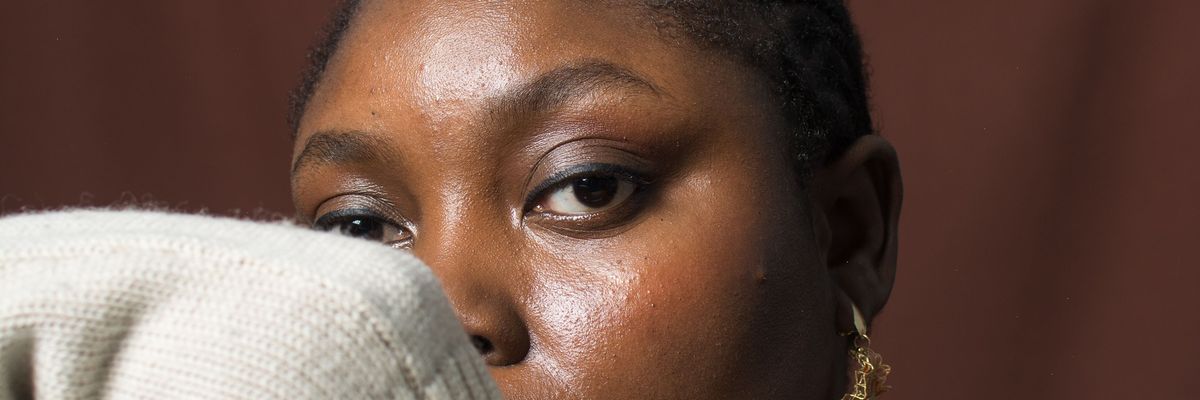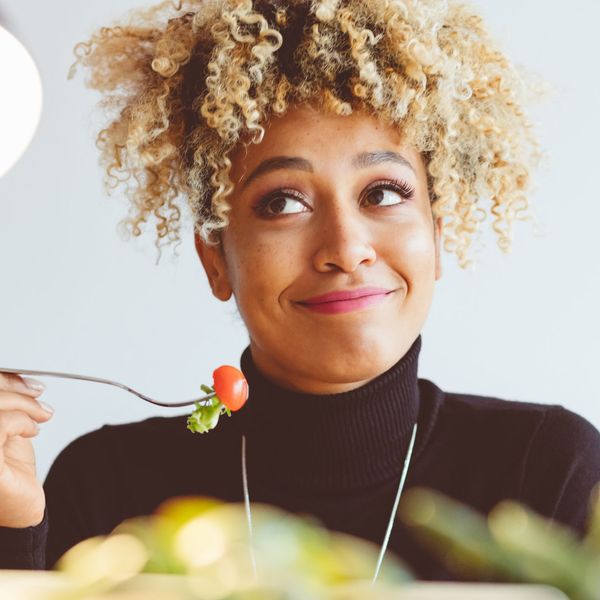
The beauty of life is that anything can happen at any moment, and you can count on the journey to help you gain perspective and strength to deal with it. When I was 21 years old, I was officially diagnosed with generalized epilepsy. Epilepsy is a neurological disorder that causes abnormal activity in the brain, seizures, and loss of consciousness.
The seizures would start off slow. First, I'd feel very tired — both mentally and physically. Then, it would become hard for me to stay focused. I would be in and out, as if I was falling asleep and waking up. After those signs, I would have the seizure and lose consciousness. I also experienced memory loss and I can only remember the events before I had the seizure.
Sound intense? It is.
When I was diagnosed, I felt upset and even betrayed. I couldn't understand why this was happening to me or where these seizures were even coming from. I had no idea what epilepsy was at the time, all I knew was I was having seizure after seizure and it was stressful.
My first seizure happened in my bedroom. I was talking with a friend and getting ready to head out. I noticed I felt drained and completely out of it, I felt zombie-like as I was getting ready. Next thing I knew, I was laying on the floor with my mom and friend hovering over me and blood scattered around me. I didn't know what happened or where the blood came from, but I was too exhausted to figure it out.
After being sent to the ER and hearing my friend tell the story, I realized what happened. I realized that on my way to the bathroom, I began shaking (convulsing), then fell and hit my head on the end of the bed. I busted the top of my nose in between my eyes and needed six stitches due to the impact.
After a while, it became more intense and the seizures were happening way too frequently. I would have seizures on the train, at work, and at home. At that point, I knew I needed to seek out some serious medical attention.
I spent a year and a half trying to figure it out and go back to "normal." I went to different hospitals and tried an array of medications. Nothing worked. I wanted to give up. It seemed like the doctors didn't know how to help me. I was losing hope in the medical system and had a hard time adjusting to what my new life would entail. I felt hopeless and remembered that my mentor at the time used to suffer from seizures. When I reached out to her, she recommended I make an appointment at NYU's neurology center and I did. I'm so grateful for her to this day because that's when I finally received the proper treatment and tests.
I was officially diagnosed at NYU, but I also had to face the hard reality that this was never going away.
My doctor informed me that the chance of epilepsy going away as an adult was unlikely, but it can be maintained. She also informed me that the type of epilepsy I have can be triggered by hormonal changes, stress, and alcohol. So, if I wanted to start a family, I would need some medical assistance to make sure I can carry seizure-free. I was literally shook! Just when I started to get a little hope, it was taken away. As for alcohol, I cut back, but not completely at first. I had some wine and a beer here and there and stuck to things with low alcohol.
Fast-forward to life after my diagnosis, I was doing fine, I hadn't had a seizure but I was taking medication every day. The medication was bittersweet. While I didn't have any seizures, I wasn't eating either. I could hardly finish a meal and I lost a significant amount of weight. I would only eat one meal a day or drink nutriments. Although eating became a struggle, anything was better than the seizures, so I continued taking my meds and smoked some weed to gain an appetite. Unfortunately, my seizures didn't stop and I stopped taking my meds and looked into holistic treatments (which I don't encourage you to do without consulting with your doctor). I realized I had to make these lifestyle changes to live seizure-free:
Avoid Anything That Can Cause Hormonal Changes
I stay away from all birth control methods, emergency contraceptives, and anything that can affect my menstrual cycle. I also take folic acid daily as a preventative measure to lower the effects of any issues I may have during pregnancy.
I Had To Accept Epilepsy
I never really accepted epilepsy in my life. For a long time, I disassociated myself with it so much, especially in the beginning. I didn't identify with being "disabled," not that there's anything wrong with that, I just didn't feel that way. I didn't want to face it, I didn't want to understand it, and I certainly didn't want to live it. I was also younger and less mature at the time, which made it even harder. I noticed when I accepted it, I paid more attention to triggers and effects, I was able to do more research and became open to exploring ways of living with it.
Keep Stress Low
Like anxiety, too much stress can be a trigger. To keep my stress low, I try my hardest to:
- Meditate every day
- Practice time-management
- Exercise or do yoga
- Attend therapy when I can
Very Low Caffeine Intake
Anxiety is also another trigger and too much caffeine makes me very anxious. I avoid anything that may cause any additional anxiety to keep it safe. I don't drink soda and stick to decaf coffee.
Eating Healthier
I struggled big time with eating and because of that, my body wasn't getting the proper nutrients it needed. I make sure I'm having the necessary amount of carbs, protein, and vegetables to maintain a healthy diet and weight.
Avoid Alcohol
Alcohol was the biggest trigger and probably the hardest one to let go of. I didn't drink much but it was still something I enjoyed. I also felt very peer-pressured to drink. Every time people would invite me to hang out, the first line would be "let's grab a drink" and it became harder to deal with.
I also felt uncomfortable sharing that I don't drink, each response was either "how you don't drink?" "you don't drink at all?" or "why you don't drink?" I don't blame the people around me for their curiosity, but it was hard to deal with on top of everything else. I was very uncomfortable with having epilepsy, especially when it came to talking about it.
Eventually, I just removed myself from certain settings like bars and when people asked why I didn't drink, I just let them know it's not for me.
Since making these lifestyle changes, I've been seizure-free for a year *insert twerk*. If you have epilepsy, please consult your neurologist before making any lifestyle changes.
Featured image by Getty Images.
Related Articles:
How A Near-Fatal Illness Transformed Hey Fran Hey's Life For The Better – Read More
What Self-Care Looks Like To Chronic Illness Warrior Devri Velazquez – Read More
The Beauty In The 'Healing Crisis' – Read More
- Living with Epilepsy Conference Lake Tahoe, CA – Epilepsy ... ›
- Living with epilepsy | Topics, Epilepsy, Nerves & brain, People's ... ›
- Living with epilepsy | Epilepsy Society ›
- Epilepsy: Living & Managing ›
- Living with Epilepsy – EFEPA – Epilepsy Foundation Eastern ... ›
- 10 Life Hacks for Living With Epilepsy | Henry Ford - LiveWell ›
- Sitawa Wafula: Why I speak up about living with epilepsy | TED Talk ›
- Living with Epilepsy | Epilepsy Foundation ›
- Epilepsy 101: Living With Seizures | For Better | US News ›
This Is How To Keep 'Holiday Season Stress' From Infecting Your Relationship
Hmph. Maybe it’s just me, but it seems like there is something really weird happening in the fall season air (because winter doesn’t officially begin until December 21) that cuddle season is in full swing while break-up season is as well. In fact, did you know that break-ups are so popular during the holiday season that December 11 is deemed Break-Up Day?
The reasons why relationships shift around this time vary; however, I did both roll my eyes and chuckle when I read that a very popular one is because it’s an easy way to get out of getting one’s significant other a Christmas present. SMDH.
Anyway, I personally think that the less shallow folks out here may contemplate calling things “quits” or they at least distance themselves a bit from their partner (and what I’m referring to is serious relationships) due to all of the stress and strain that oftentimes comes with the holidays whether it be financial, familial, due to their tight schedules or something else.
Listen, I would hate for you and your man to miss the fun and happiness of experiencing this time of year, all because you are so overwhelmed or irritated that you can’t really enjoy it. That’s why I have a few practical tips for how to avoid allowing the typical holiday season stress from INFECTING your relationship.
Manage Your Expectations
 Giphy
GiphyUnmanaged expectations. If there is a main reason why the holiday season tends to be so stress-filled for so many people, I’d bet good money that this is the cause. And when you’re in a long-term relationship, expectations can manifest themselves in all sorts of cryptic and/or unexpected ways. You might have relatives who assume that you are going to be with them for Thanksgiving or Christmas when you have other plans in mind. You might be thinking that you are going to spend one amount for presents while your man is thinking something totally different. When it comes to scheduling, your signals may be crossed.
And you know what? To all of these scenarios, this is where clear and consistent communication come in. Don’t assume anything. Don’t dictate anything either. From now until New Year’s, mutually decide to check in once a week, just to make sure that you are both on the same page as it relates to the holidays and what you both are thinking will come along with it. The less blindsided you both feel, the less stressed out you will be. Trust me on this.
Set (and Keep) a Budget
 Giphy
GiphyOkay, so I read that last year, 36 percent of Americans incurred some type of holiday-related debt. Hmph. Last year, there was still some sense of normalcy in this country, chile, so I can only imagine what finances are gonna look like over the next several weeks. That said, since I don’t know a lot of people who don’t find being broke stressful, make sure that you and your bae set a budget and then stick to it this year — no ifs, ands or buts.
Because really, y’all — it doesn’t make sense to deplete savings and/or max out credit cards for a few days of giggles only to be damn near losing your mind because you don’t know how to make ends meet come Dr. Martin Luther King, Jr. Day.
And by the way, this tip doesn’t just speak to things like food and gifts; I also mean travel. If it doesn’t make a ton of sense (or cents) to be all over the place this year — DON’T BE.
Keep Matthew 5:37 at the Forefront
 Giphy
GiphyIf off the top of your head, you don’t know what Matthew 5:37 says, no worries, here ya go: “But let your ‘Yes’ be ‘Yes,’ and your ‘No,’ ‘No.’ For whatever is more than these is from the evil one.” That verse right there? Oh, it’s a boundaries lifesaver! I say that because do you see “maybe” or “I’ll think about it” in there? Nope. LOL. It says that you should tell people “yes” or “no” and leave it at that — and that complements Anne Lamott’s quote, “’No’ is a complete sentence” impeccably well. Yeah, you’ve got to remember that anything beyond a yes or no to a request is privileged information; you don’t owe anyone details or an explanation.
Besides, if you are really honest with yourself, when someone asks you something and you give a “Umm, let me think about it” kind of reply, more times than not, you already know what your answer is going to be — so why not let you both off of the hook? Give your response. Commit to that. And let everyone (including yourself) get on with their lives and schedules.
I promise you that when it comes to those holiday parties, you are pissing more folks off by not RSVP’ing or doing so and not showing up than just saying, “Thank you but not this year” off the rip.
Remember That Your Personal Space Is Privilege Not a Right
 Giphy
GiphyA friend of mine recently bought a new house and invited me over to come see it. He’s a single man with no children, so as I was taking in all of the space that he had, especially as I walked through his finished basement, I joked about relatives coming to live with him. “Hell no” and “absolutely not” were pretty much his immediate responses as he went on to say that some folks even had the nerve to be offended when he told them that he had no intentions on taking DNA in.
Ain’t it wild how people think that your stuff is their right? And yes, that brings me to my next point. Your home is your sanctuary space. If you want to host folks this year — cool. If not, ALSO COOL. Please don’t let folks (family included) guilt you into how they want you to act or even into what they would do if the shoe was on the other foot. You are not them — and as one of my favorite quotes states, “If two people were exactly alike, one of them would be unnecessary.” (A man by the name Larry Dixon said that.)
Hell, my friends? They know that I am good for sending them random things that they need or even want all throughout the year. Coming over to hang out at my pace, though. Uh-uh. Chalk it up to being a card-carrying member of the ambivert club yet I like keeping my living space personal — and I sleep like a baby, each and every night, for feeling that way.
Always remember that your space, your time, your resources, your energy and shoot, yourself period (including your relationship), are all things that are your own. You get to choose how, when and why you want to share them. The holiday season is certainly no exception.
Cultivate Some “You Two Only” Traditions
 Giphy
GiphyIt’s not uncommon for some couples to hit me up after the holiday season to “detox.” Sometimes it’s due to the financial drama (and sometimes trauma) that they experienced. Sometimes it’s because they allowed their relatives (especially in-laws) to get more into their personal business than they should’ve. More than anything, though, it tends to be because they didn’t get enough quality time together and so ended up feeling “disconnected.”
Please don’t let that happen. Listen, I’m not even a holidays kind of woman and yet, I will absolutely sit myself down with some hot chocolate and chocolate chip cookies to enjoy a Hallmark holiday film or two. Aside from the fact that most of them are lighthearted and sweet, I also like that they usually focus on couples loving on each other amidst all of the holiday beauty and ambiance — which is something that all couples should set aside some time to do.
Maybe it’s a vacation. Maybe it’s a staycation. Or maybe it’s my personal favorite, A SEXCATION. Whether it’s for a few days, the weekend or even overnight — don’t you let the holidays go by without setting aside time for you and your man to celebrate one another. Don’t you dare (check out “Are You Ready To Have Some Very Merry 'Christmas Sex'?”).
GET. SOME. REST.
 Giphy
GiphyI once read that 8 out of 10 people get stressed out over the holidays and 3 out of 10 lose sleep during to it — and when you’re stress-filled and sleep-deprived, that can absolutely lead to hypersensitivity, making mountains out of molehills and even not being in the mood for sex.
Your relationship can’t afford to go through any of this, so definitely make sure to prioritize rest. I don’t care how unrealistic it might seem during this time, sleep should never be seen as a luxury; it will always and forever be a great necessity.
That said, try to get no less than six hours of shut-eye in (check out “6 Fascinating Ways Sex And Sleep Definitely Go Hand In Hand”) and even ask your bae to take a nap with you sometimes (check out “Wanna Have Some Next-Level Sex? Take A Nap, Sis.”). Not only will sleep help to restore your mind, body and spirit but, when it’s with your partner, it’s an act of intimacy that can make you both feel super connected, even in the midst of what might feel like chaos.
___
Holiday season stress is real. Still, never give it the permission or power to throw your relationship off. Put you and your man first and let the holidays be what they are gonna be, chile.
Let’s make things inbox official! Sign up for the xoNecole newsletter for love, wellness, career, and exclusive content delivered straight to your inbox.
Featured image by Shutterstock
Skincare Hacks That Actually Make Hyperpigmentation...Worse
Something that I wish I had learned back when I was experiencing more breakouts than I do at this point in my life is the difference between hyperpigmentation and actual acne scars. Although people oftentimes believe that they are one in the same, that actually isn’t the case.
Yes, both can result in darker marks on your skin; however, while hyperpigmentation can change the color of it, scars often also alter your skin’s texture. And yes, it’s important to know the difference between the two because, that way, you know how to treat each issue.
Since the focus today is on hyperpigmentation, let me break that down a bit further. Basically, what gives your skin pigment is melanin. Well, when your skin cells end up getting damaged or injured, oftentimes your body’s response is to create more melanin as a part of the healing process. Problem is, sometimes your system overproduces melanin, and that can lead to darker patches of skin. This can especially be the case for our skin since we naturally produce more melanin anyway.
When hyperpigmentation transpires, we usually want to get rid of it as soon as possible. And while doing things like applying sunscreen, using skin lightening products, and even taking certain vitamins can help — the main thing to do is incorporate a gentle skincare regimen and then use patience with it. If you don’t and you go overboard in your approach, you could look up and end up with hyperpigmentation issues that are far worse (and longer lasting) than they were to begin with.
How? I’ll explain.
Using Products That Create Breakouts
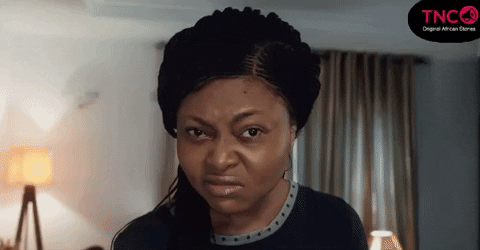 Giphy
GiphyWho likes getting a pimple? For me, though, what pisses me off to no end is that there is about a 70 percent chance that if one pops up, some sort of hyperpigmentation is going to be left behind whether I mess with it or not. Ugh. The reason why is because zits bring inflammation and inflammation can trigger hyperpigmentation.
So, you know what that means, right? It’s important to do all that you can to avoid getting a pimple in the first place and that includes not using products that will clog up your pores or irritate your skin like lanolin, thick butters (especially on your face), mineral oil, D&C coloring, a fatty acid called isopropyl palmitate — these are a few things that can lead to breakouts, if you’re not careful. That’s why it’s always a good idea to read the labels of the things before purchasing them.
Oh, and when it comes to things like shea and mango butter, it’s usually best to use them on other parts of your body than your face (because your face is more fragile than, say, your arms or legs).
Doing Too Much Exfoliating
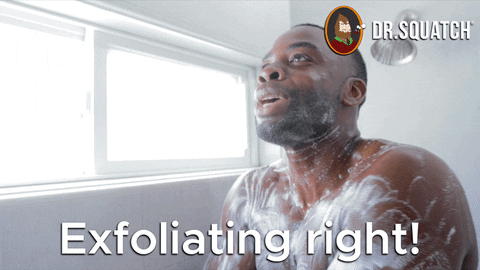 Giphy
GiphyI am a fan of DIY chemical peels; so much so that I wrote an entire article about it a couple of years ago (check out “I've Been Doing At-Home Chemical Peels. Here Are The Pros And Cons.”). The things that I like most about them are they are a super-effective way to exfoliate and even out my skin tone. That said, though, be careful with doing too much exfoliating whether it’s via a chemical peel, a skin scrub or even dry brushing.
Not only can over-exfoliating irritate your skin, it can dry it out, cause lots of skin flakes, lead to inflamed skin — and all of this can result in hyperpigmentation as your skin is in the process of “getting back to normal.” So, just how often should you exfoliate? Unless your skin is really oily, 1-2 times a week is more than enough (2-3 if it is on the oily side).
Layering with Too Many Products
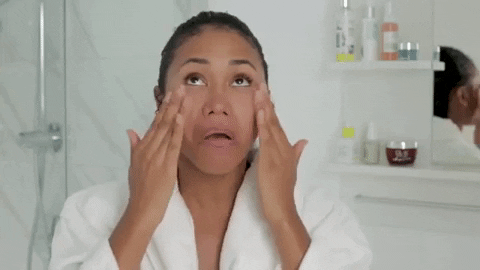 Giphy
GiphyOh, I know — if you watch too many of those TikTok and Instagram videos where women are applying 6-10 products on their face before adding any make-up to it, it can tempt you to follow suit. Use some caution with that, though. Each skincare product comes with its own list of ingredients and every time you add something else that has another set of ingredients onto it, that increases the chances of you irritating your skin or causing it to break out.
My two cents would be to ease into each product. Start with one thing and, if it’s all good (after about a week or so), incorporate another. Oh, and try to keep it down to 3-5 skincare products tops. When it comes to effective skin routines “less is more” is a motto to live by. Otherwise, redness, flaking and hyperpigmentation may be in your future.
Using Skincare Products That Contain Fragrance
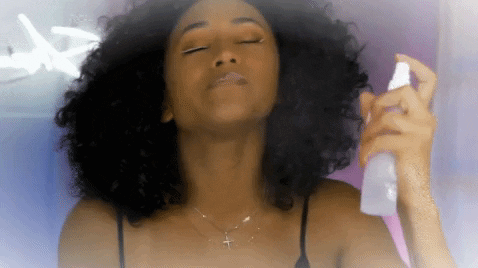 Giphy
GiphyAlthough applying skincare products that have a nice scent to them can cause your skin to smell amazing, sometimes they can be both an irritant as well as an allergen — and that can cause your skin’s barrier to weaken or become really irritated. And again, whenever your skin is damaged in some way, the recovery process can lead to hyperpigmentation. So, it really is best to avoid scented skin products at all costs (if you want flawless skin, that is).
Applying Too Much Heat
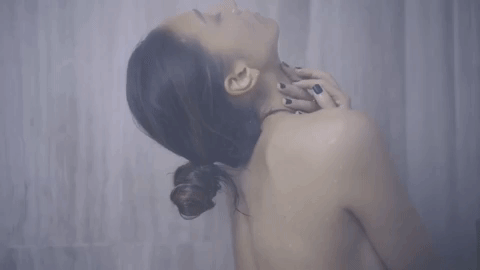 Giphy
GiphyBet you didn’t see this one coming. How about increased blood flow, over time, can lead to hyperpigmentation. Basically, it’s because of the fact that, sometimes, too much consistent blood flow can result in skin inflammation and, as we already discussed, when the body is healing from inflammation, that can sometimes cause hyperpigmentation to occur.
The takeaway here: use sunscreen when you’re outdoors and try to keep those scorching hot showers to a minimum. Being in warm water for between 7-10 minutes is ideal.
Not Testing Products (Especially Acids) on Your Arm First
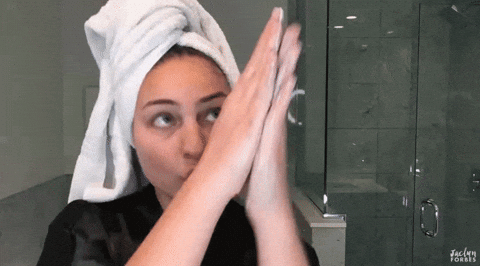 Giphy
GiphySomething that definitely keeps my skin glowing is certain acids: hyaluronic acid, mandelic acid and kojic acid soap (oh and some vitamin C extract too), especially. All of these are pretty good on darker skin tones; however, because we all are different, before applying any acid to your skin, make sure to test it on your arm first (and wait 48 hours, just to be sure that the coast is clear).
Trust me, I know of what I speak because I once tried some pretty potent pineapple extract on my face once and it mildly burned the lower part of my right cheek to the point where it took about four months before everything turned back to normal. Hmph, if I can keep anyone from experiencing that drama, I absolutely will.
7. Experimenting with Harsh Essential Oils
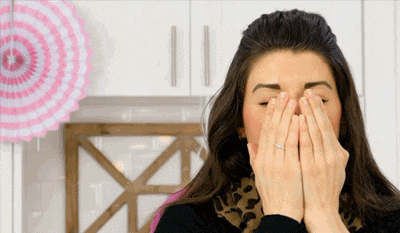 Giphy
GiphyListen, if you want a zit to go away, damn near overnight, apply some tea tree oil to it. Just make sure that you dilute it with a light carrier oil (like grapeseed, jojoba or rosehip oil) first. Why? Oh, I have learned from very up close and personal experience that certain essential oils can also burn your skin and, as we’ve already discussed, ad nauseum at this point, damaged skin typically results in hyperpigmentation on some level. Yeah, essential oils are a blessing. They are also nothing to play with. Dilute, dilute, DILUTE.
___
You know, they say that it can take several weeks, if not many months, for hyperpigmentation to totally fade away. Hmph. To me, that’s even more incentive to do all that you can to avoid it transpiring in the first place — and that includes NOT incorporating counterproductive skincare routines and regimens.
The more you know, sis. For real.
Let’s make things inbox official! Sign up for the xoNecole newsletter for love, wellness, career, and exclusive content delivered straight to your inbox.
Featured image by Shutterstock




